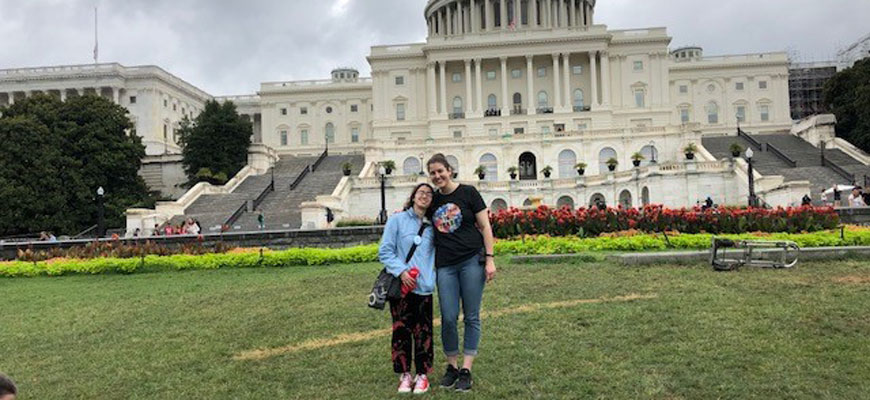Eryn Star, ’21, Works for Disability Rights Through Washington Internship
Related Posts
Connect With Us
August 16, 2019
By Eryn Star, ’21

Eryn Star (left) and NCIL internship supervisor Lindsay Baran stand in front of the U.S. Capitol. Star is a junior majoring in sociology and English with a concentration in public policy, and is a member of the Prentiss M. Brown Honors Program and Gerald R. Ford Institute for Leadership in Public Policy and Service. Star is the child of Jake and Sharon Star of Centerbrook, CT, and is a graduate of Valley Regional High School.
When I began embracing my autistic identity and getting involved in disability rights, I didn’t know what I wanted to contribute and where my place should be. This summer, the National Council on Independent Living (NCIL) ended up being the perfect place for me to explore those questions.
A grassroots disability rights organization based in Washington, D.C., NCIL exists to ensure that the perspectives of disabled people are valued and we have the equal right to choose how we want to live our lives. NCIL is very involved in advocating for disability rights legislation on Capitol Hill. While NCIL looks at a wide range of issues, the main focus is on ensuring that disabled people live in our homes and communities, not in institutions.
As a policy intern, I went several times to Capitol Hill to attend hearings and meet with staffers. In the office, I wrote summaries of upcoming bills such as Senator Bernie Sanders’ Medicare for All Act, one of a few bills that would create a single-payer health insurance system. The summaries are plain-language explanations to help NCIL staff explain the bills to the wider disabled community and advocate on Capitol Hill.
I also compiled information on many of the 2020 presidential candidates’ positions on disability policies. Julián Castro’s housing and health care proposals consistently include references to disabled people, while most candidates don’t mention disabled people. Bernie Sanders is the only candidate with a disability rights section on his website. Miami Lighthouse, an organization for blind people, found that none of the candidates’ websites, Democrat or Republican, were fully accessible to blind and low-vision people. Although so many current issues in the United States impact thousands of disabled people, we are often erased and that needs to change.
I also posted an article for NCIL’s blog about the prevalence of teachers abusing disabled students. The formal academic study of educational trauma arguably wasn’t started until 2018 but it’s an important issue. Writing this post was empowering because my article gave other survivors a space to share their experiences and my own education trauma story was validated. I realized that other disabled people view my story as important and want to advocate for the changes we hope to see in the education system. What I know now is that writing must be a part of my future work.
The most difficult thing I encountered during my internship was seeing oppression within the disability rights movement. I knew that racism, queerphobia, and ableism existed but it is another thing to experience and witness that in person. This has made me determined to advocate for a future where multiply marginalized disabled activists are centered in the movement.
Interning at NCIL confirmed for me that disability activism is my path. I’ve become more aware of the possibilities of what I can do. I plan on bringing back everything I learned to help Albion Diversability, the disabled students organization I helped create and will lead in 2019-20.
I want to change the culture of our society so that systemic oppression against everyone is dismantled. That’s how equal rights will be fully realized.